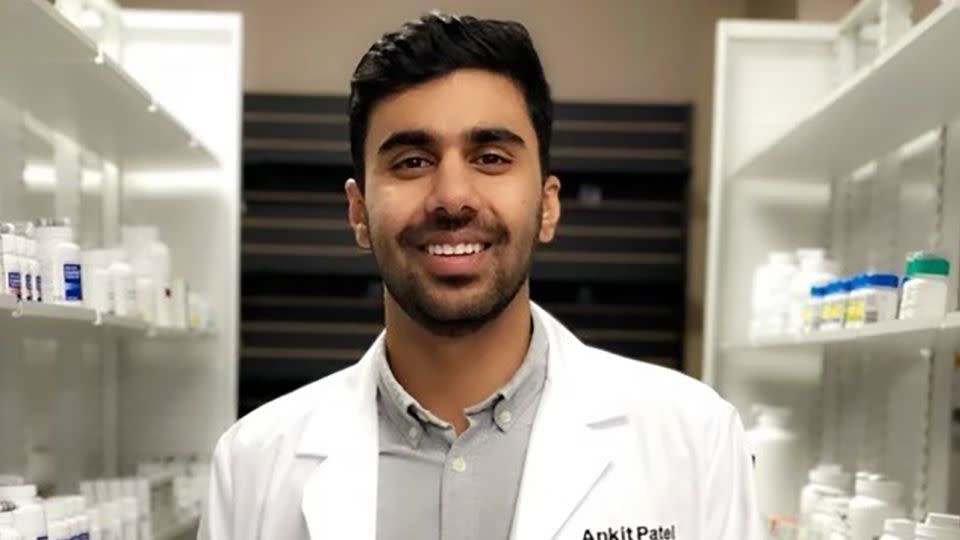The medical cannabis pioneers of Georgia: first pharmacy sales in US start in the Deep South
- Oops!Something went wrong.Please try again later.
On Friday, Dr. Ankit Patel will become a pharmaceutical pioneer. He’ll be the first pharmacist to legally sell medical cannabis from a pharmacy counter in the United States.
“It’s awesome,” Patel said. “It’s historic.”
Patel’s Robins Pharmacy and two others in the same region, Omega Pharmacy and the Allen Pharmacy Group, are the first to get a state license to sell low-THC medical cannabis. THC, or tetrahydrocannabinol, is the part of the cannabis plant that produces a “high” — one of the key reasons doctors may suggest patients use medical cannabis to help with pain, nausea, insomnia and other issues. Products can include THC oil, tinctures, topicals, capsules and lozenges.
Robins Pharmacy is in Warner Robins, about a 90-minute drive from Atlanta, an area most people would not typically associate with being on the cutting edge of medicinal cannabis access. While medical cannabis has been legal for decades in some parts of the United States, only Georgia is allowing pharmacies to sell medical cannabis. When that law changed this year, it was met with enthusiasm from independent pharmacies throughout the state, but the shift was a long time coming.
The Georgia General Assembly approved the distribution of low-dose THC oil in 2019, but it has taken years for the state to create the regulatory infrastructure to sell it. Georgia Gov. Brian Kemp signed off on Georgia Board of Pharmacy rules last month that cleared the way for pharmacies to sell THC.
“I’ve been following the laws in Georgia about passing it, and I’ve been excited about this possibility for about four years now,” Patel said. “When they finally said independent pharmacies will be able to carry it, I filled out the license form immediately. I knew I had to get this.”

And more pharmacies will likely come on line soon, GA Access to Medical Cannabis Commission said.
To get state approval, pharmacies submit an application and will get an inspection from the state drugs and narcotics agency. Inspectors check out the store’s security, ask staff questions to see how much they know about the products, and about how to handle the products. If the store passes, then the state will grant them a dispensing license.
Pharmacies must keep the cannabis products on shelves with the rest of the prescription medicines.
“Just like all other ‘dangerous’ drugs,” said Bill Posey, the owner of Allen Pharmacy Group said. “Blood pressure medicine is also considered a ‘dangerous’ drug in this circumstance. Everyday we sell drugs that I would consider more dangerous than medical cannabis.”
Posey’s pharmacy will start selling the low-dose THC products Monday.
“We have already had someone calling, wanting to know when they can come in and make a purchase, so I know there’s a need,” Posey said.
Posey said he knows several doctors who have been prescribing medical cannabis for years, but patients have to travel out of state to get it.
“It’s going to be a great,” Posey said.
He sees cannabis as a good replacement for pain relievers like opioids, or at least patients could take fewer opioids. Opioids often leave people feeling disconnected. People who use medicinal cannabis often say they feel more engaged and can resume their normal activities.
Customers with pain conditions, some stages of cancer, sickle cell and Crohn’s will be eligible to buy medicinal cannabis in Georgia. The state’s law restricts sales to people who have one of 16 diseases spelled out in the law. Patients interested in cannabis have to get permission from their doctor to use it, and they must apply to the state for a card. They’d then show that card to the pharmacist or the clerk at the dispensary to get the product. The pharmacist will scan the card to make sure the person is in the state database. Georgia pharmacies can’t sell to people from out-of-state. The store can sell up to 20 ounces of the product, and the state will track the sale.
Having a pharmacist sell cannabis will have advantages, said Dr. Jordan Day, a pharmacist at Omega Pharmacy in the tiny town of Omega, Georgia. Her pharmacy will start selling the THC products next week. Pharmacists can anticipate any potential bad drug interactions, and they can help a patient wean off their other medicines the cannabis would be replacing.
“We’ll be able to show them the products, hopefully give them a little bit of information, find out what they are wanting to use it for,” Day said.
Day sees medicinal cannabis as a possible replacement for pain, sleep and anxiety medicines.
“With the pharmacist and the doctor involved, that really is the best thing that the patient could have,” Day said.
Plus, being an independent pharmacist, Posey said they often have more time to spend with patients that they’ve known for years. With cannabis, as with any drug, he’ll make sure patients are using the medications correctly.
“We don’t just give people medication and say, ‘OK, you’re done.’ We like to make sure that we always treat everyone who walks in like family,” Posey said.
The pharmacists will also act as kind of ambassadors for people who may be more unfamiliar with the product or the change in the law.
“Right now, we’re going through an opioid shortage, and I talked to all my pain medicine patients about it, and I let them know that if this is something that they’re interested in, it’s legal in the state of Georgia,” Patel said. “You know, it’s much more natural, less addicting option than opioids.”
Patel said he doesn’t expect long lines on Friday when sales begin, but he looks forward to educating his patients about cannabis possibilities.
“It’s great to be able to give them an alternative option than your normal traditional pharmaceuticals,” Patel said.
For more CNN news and newsletters create an account at CNN.com

